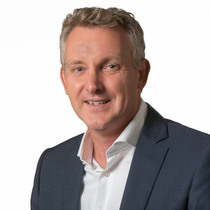Eelze van der Veen
Nationality: Dutch
Job title: EVP IT at a logistics company
Previous degree: bachelorbusiness informatics (bedrijfskundige informatica) at Windesheim University of Applied Sciences (Hogeschool Windesheim)

1. What was the primary reason for you to choose doing an MBA? And why did you decide to do your MBA at RSM?
“I have 30 years of work experience. I wanted to validate what I already know, in combination with up-to-date theoretical context. I looked for business-oriented education, and quickly came to MBA because I wanted to understand business processes and functions. The GEMBA comes closest to C-level. I like RSM’s approach and its high FT rankings, and Erasmus University has a huge amount of knowledge to back up the study material.”
2. What expectations did you have studying for your Global Executive MBA in a world in motion?
“The only constant we have is change. It’s happening all the time. Business leaders have to work together to make a change, especially when it comes to green energy. I was shocked that the recent climate change climate conference in Egypt couldn’t make a simple decision. We need an appetite to change which is possible if there’s a will. We as C-level executives can learn the toolset and theoretical context to be able to move forward, and influence and help change the world one step at a time.”
3. How would you describe your RSM MBA experience so far?
“It's a lot of hard work, and a lot of fun. Everyone is here to learn and improve themselves. The amount of knowledge sharing is phenomenal. It’s not an old schoolbook approach. We’re being challenged to not study the material but study the core of it. We’re bombarded with articles, and we’re learning to understand what’s behind it. It’s been a shift to have to learn how to study again, and to understand what it’s really about.”
4. What has been the most challenging assignment or course during the GEMBA?
“We’ve had operations management, marketing, managerial decision analysis and strategic leadership development so far. The first group assignment for operations management was tough. We had to learn the group dynamics. Everyone was searching for their roles. We discussed what went well, what we could improve, and what we could learn from the other groups. There’s a lot of evaluation and feedback, to and from other students. The learning by design is interesting.”
5. What impact does the Strategic Leadership Development component of the programme (SLD) have on you?
“It’s forcing you to get out the rat race and think about your core values and analyse your observations and emotions. It’s getting yourself back into who you really are, what you want to be and what you want to achieve. It’s the perfect tool for self-reflection. There’s no good or bad. It’s a great enabler to improve yourself within your own boundaries.”
6. If you had to choose one Sustainable Development Goal, which one would you choose?
“SDG 13: climate action. We studied the SDG goals as part of a group assignment last week. We learned about a company that was digging holes to collect rainwater in Africa. It was very interesting. I’m not a green activist, but climate change is happening, even if it’s denied by some politicians. We’re the only ones who can make a change. It has to be fought by us – our generation – through operations management, and other decisions.”
7. Has your MBA journey changed your outlook on what your career will be like after doing an MBA?
“Circumstances brought me here. It all started with a reorganisation at my work. I want a change, and combine my experience with my new knowledge to help other people. Doing the MBA is a positive change towards this new step. My “I WILL” statement is that I want to continue to learn every day. I defined five scenarios for my next career during mentoring as part of my strategic development plan, for example to move into a big consultancy firm, or become a CIO lead. Either way, the MBA is an eye opener, an opportunity for change.”
8. What advice could you give to people who are considering doing a Global Executive MBA?
“Be the master of your own destiny. Define a clear goal of where you want to be in 10 years’ time. Education at executive level can be a powerful tool to get you there. It’s a privilege to be able to do an MBA, but it costs a lot of energy and time, so you need to be motivated and committed if you want to get something out of it. The investment can give you so many benefits, so take the opportunity.”